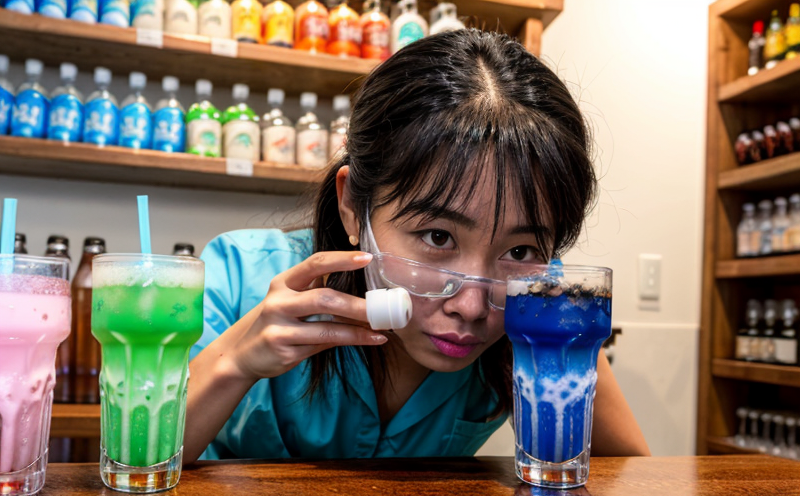EN 12322 Campylobacter Detection in Beverage Ingredients
The detection of Campylobacter species, particularly in beverage ingredients, is a critical aspect of ensuring food safety and public health. The European standard EN 12322 provides a robust method for the quantitative recovery and enumeration of Campylobacter jejuni and C. coli from raw materials used in beverages such as milk, dairy products, and water. This service ensures that manufacturers can maintain compliance with international standards while safeguarding consumer safety.
The standard is designed to be sensitive enough to detect even low levels of Campylobacter in complex matrices like fresh produce or processed ingredients. It involves a series of steps including sample preparation, selective enrichment, isolation on specific growth media, and confirmation using biochemical tests or molecular techniques such as PCR.
The importance of this service cannot be overstated given the potential for Campylobacter to cause severe gastrointestinal illness if not properly controlled. According to the World Health Organization (WHO), campylobacteriosis is one of the most common causes of bacterial gastroenteritis worldwide, affecting millions annually. Proper detection and control measures are essential in preventing outbreaks that could otherwise lead to significant health risks.
Our laboratory adheres strictly to EN 12322 guidelines throughout every step of the process, ensuring accurate results. From initial sample collection through final analysis, we employ advanced techniques that allow us to detect down to levels as low as 1 CFU/mL in some cases. Our team of experts ensures rigorous quality control at all stages, providing reliable data for your compliance needs.
By choosing our EN 12322 Campylobacter Detection service, you can rest assured knowing that you are meeting stringent regulatory requirements and protecting the health of those who consume your products. This service not only supports food safety but also helps build consumer trust by demonstrating your commitment to producing safe beverages.
- Ensures compliance with international standards
- Provides sensitive detection capabilities for low-level contamination
- Supports rigorous quality control practices
- Builds consumer confidence through transparent reporting
Applied Standards
The primary applied standard for this service is EN 12322, which specifies a method for the quantitative recovery and enumeration of Campylobacter jejuni and C. coli from raw materials used in beverages such as milk, dairy products, and water. This European standard was developed to address the need for accurate detection methods that can reliably identify these pathogens even when present at very low concentrations.
The standard outlines detailed procedures for sample preparation, selective enrichment, isolation on specific growth media, and confirmation using biochemical tests or molecular techniques such as PCR. It emphasizes the importance of proper handling and processing of samples to avoid contamination during any stage of the procedure. Compliance with EN 12322 is crucial not only for meeting regulatory requirements but also for maintaining high standards of product safety.
Other relevant international standards include ISO 6887, which deals with general aspects of food microbiological analysis; ISO 4833, covering the enumeration of microorganisms on surfaces and in liquids using the pour plate method; and EN ISO 17025, setting out requirements for competence in testing and calibration laboratories. These standards collectively form a comprehensive framework that supports accurate and reliable detection of Campylobacter species.
Incorporating these internationally recognized guidelines into our service ensures that we provide the most precise results possible while adhering to global best practices in microbiological testing.
Industry Applications
The application of EN 12322 Campylobacter Detection is particularly pertinent for companies involved in the production and distribution of beverages, especially those utilizing raw materials such as milk or water. By implementing this service, businesses can ensure they are meeting stringent regulatory requirements set forth by various authorities including the European Commission.
For instance, dairy farms supplying ingredients to beverage manufacturers must adhere to strict hygiene protocols to prevent contamination with Campylobacter. Similarly, bottling plants handling water sources need to maintain high levels of cleanliness to avoid introducing harmful pathogens into their products. Our service helps these entities verify that their processes are effective in eliminating such risks.
Additionally, this detection method is valuable for research and development teams looking to improve product safety and efficacy. By identifying potential sources of contamination early on, they can make necessary adjustments to formulation or processing methods before reaching commercial scale. This proactive approach enhances overall food safety while reducing the likelihood of recalls or lawsuits related to contaminated products.
Furthermore, large-scale suppliers of agricultural inputs may benefit from this service by ensuring that their offerings meet stringent quality assurance criteria demanded by end-users in the beverage industry. Through regular testing, they can demonstrate consistent performance and reliability, fostering long-term relationships with key clients.
Environmental and Sustainability Contributions
The detection of Campylobacter in beverage ingredients not only relates directly to food safety but also has broader implications for environmental sustainability. By ensuring that raw materials are free from harmful microorganisms, companies can contribute positively towards reducing the incidence of waterborne diseases among communities dependent on these products.
- Reduction in Waterborne Disease Incidence: Detecting and eliminating Campylobacter helps prevent outbreaks of gastroenteritis, which impacts public health worldwide. Cleaner raw materials reduce the risk of transmission through beverages.
- Sustainable Supply Chain Practices: Ensuring that every link in the supply chain follows strict hygiene standards promotes sustainable practices throughout agricultural and manufacturing processes.
- Better Resource Management: By avoiding contamination, resources such as water used in production can be conserved more efficiently without compromising quality or safety.
Incorporating robust detection methods like EN 12322 into daily operations supports long-term goals of sustainability by promoting cleaner environments and healthier communities. This aligns with broader corporate social responsibility initiatives aimed at improving global health outcomes through responsible business practices.





